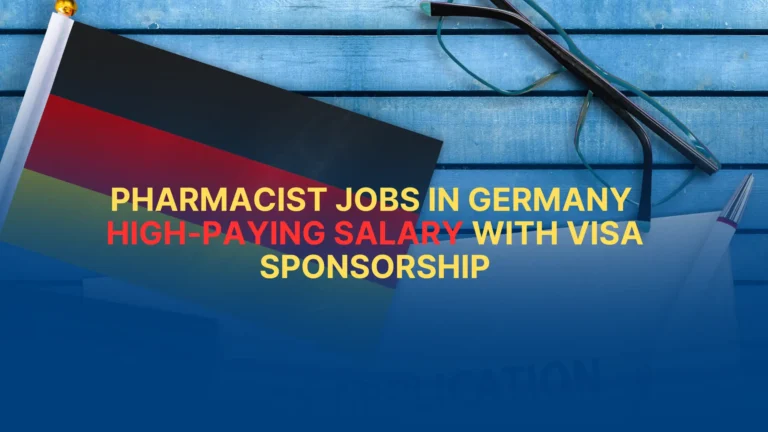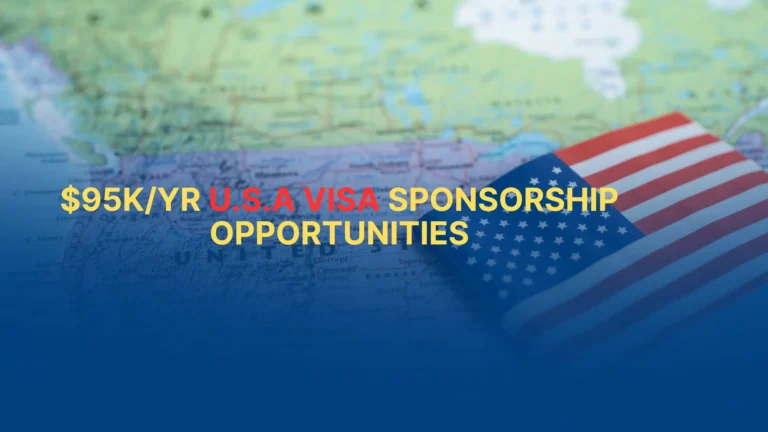High-Demand Jobs in Germany with Visa Sponsorship for Foreigners – Earn up to CAD $90,000 Annually
Germany has positioned itself as one of the most attractive destinations for foreign workers seeking long-term employment opportunities. With a stable economy, advanced healthcare system, and a growing demand for skilled professionals, Germany continues to invite thousands of foreign nationals to fill job vacancies that are increasingly difficult to fill locally.
The Federal Republic is not only known for its rich history and technological advancements, but it has also established itself as a hotspot for immigration-based employment programs that offer full visa sponsorship and long-term residence pathways.
Foreign job seekers looking to relocate to Europe often prioritize countries that support smooth visa processing, reliable employer sponsorships, and competitive wages. Germany offers all three.
With aging demographics and low birth rates, the labor market is experiencing significant gaps, particularly in healthcare, information technology, engineering, and manufacturing sectors. This growing demand for talent has made the country one of the easiest places in Europe to secure employment with a fully sponsored work visa.
Applicants from countries like India, Nigeria, the Philippines, Kenya, and Brazil are increasingly drawn to the German job market not only because of the professional growth opportunities but also due to the country’s inclusive immigration policies that cater to non-EU citizens.
In 2025 and beyond, job offers with visa sponsorship in Germany are expected to grow in both volume and diversity, giving foreign professionals access to high-salary roles often exceeding CAD $90,000 annually.
The government’s open-door employment policies are designed to attract foreign professionals with specialized training and international work experience. These programs often lead to permanent residency or even citizenship if all conditions are met over time.
Whether you are a registered nurse, a software engineer, or a mechanical technician, there are viable pathways that allow you to legally live and work in Germany while receiving competitive compensation and full employment benefits.
Understanding the landscape of high-demand jobs in Germany with visa sponsorship is the first step toward building a successful career in Europe’s largest economy. In this detailed guide, we’ll explore the key sectors, salary expectations, visa options, and specific qualifications that can fast-track your employment journey in Germany.
Why Work in the High-Demand Industry?
High-demand industries in Germany are not just growing rapidly—they are central to the nation’s economy. Foreign nationals who secure employment in these sectors often find themselves in stable roles with long-term contracts, competitive salaries, and government-backed benefits.
Industries such as IT, healthcare, engineering, and skilled trades have reported severe workforce shortages in recent years. This means that qualified foreign professionals are no longer competing against local workers but are, in fact, being actively recruited to fill essential roles.
The German economy, which stands as the fourth-largest in the world, depends heavily on a robust labor force to maintain its global status.
Sectors like renewable energy, automotive manufacturing, biotechnology, and AI research have become critical pillars of economic development. These sectors constantly require fresh talent, and when the domestic labor market falls short, the government responds by easing immigration and employment rules to attract foreign professionals.
One of the key reasons to work in a high-demand industry in Germany is job security. Positions in these sectors are often immune to economic fluctuations.
Additionally, companies in high-demand industries offer structured career advancement, training programs, and relocation support to help international workers settle in quickly. Many employers are now offering onboarding services in English, making it easier for newcomers to adapt to the new environment.
These industries also offer some of the highest salaries in the country. A software developer, for instance, can earn between CAD $65,000 and CAD $90,000 annually, depending on experience and specialization. Similarly, licensed nurses and caregivers can earn wages that far exceed the European average, particularly when working in major urban areas or specialized care units.
Finally, jobs in these industries often come with added perks like language training, housing support, relocation bonuses, and sponsored visa processing. For anyone looking to build a meaningful, well-paid, and stable career abroad, Germany’s high-demand sectors present one of the best opportunities worldwide.
Types of High-Demand Jobs in Germany with Visa Sponsorship
Germany’s employment market is wide and diverse, but only certain job categories consistently qualify for visa sponsorship. These roles are often part of the Skilled Worker Immigration Act, which facilitates employment for professionals from outside the EU. Among the most sought-after positions are roles in healthcare, IT, engineering, skilled trades, and logistics.
Healthcare is perhaps the most urgent area. Registered nurses, elderly care professionals, and physiotherapists are in short supply across the country. Hospitals and private care homes are actively recruiting international healthcare workers, with full visa sponsorship and onboarding programs tailored to foreign staff. Many of these roles also come with the possibility of permanent residence after a few years of service.
The IT sector is another major area for international recruitment. Software developers, cybersecurity analysts, and data engineers are in especially high demand. Given Germany’s digital transformation, IT companies are frequently extending job offers to foreign candidates who can bring new skills and innovative thinking. These roles are typically high-paying and offer the flexibility of remote work, hybrid schedules, and international mobility.
Engineering is a backbone of the German economy. Mechanical, civil, and electrical engineers are needed in industries ranging from automotive to renewable energy. Companies often sponsor skilled engineers for long-term employment, particularly those with specialized certifications or international project experience.
Skilled trades such as plumbing, welding, electrical installation, and carpentry are also on the high-demand list. Germany’s vocational education system creates a constant need for technically trained professionals, and foreign workers with certified technical expertise are welcomed across the country.
Finally, the logistics and supply chain sectors are actively hiring warehouse managers, forklift operators, and transport coordinators. Due to Germany’s strategic location in Europe, efficient supply chain operations are vital, and employers are willing to sponsor visas to secure a dependable workforce.
Entry-level Skills and Experience Required
While some high-demand jobs require specialized degrees or certifications, many visa-sponsored roles in Germany are open to foreign applicants with moderate experience and basic training. This is especially true in sectors like healthcare support, construction, and logistics, where formal education requirements are less stringent compared to fields like engineering or IT.
For roles such as care assistants or nursing aides, having basic medical training, a high school diploma, and a few years of experience is often sufficient. Employers may also accept applicants who are willing to complete further training upon arrival in Germany.
Language proficiency, particularly in German, is a major asset. Although some positions require only basic German skills, most employers appreciate candidates who are open to learning the language to facilitate better integration.
In IT and tech-related jobs, proven work experience can sometimes outweigh formal degrees. Developers with a portfolio of completed projects, cybersecurity professionals with international certifications, or network engineers with real-world experience can qualify for visa sponsorship even if they do not hold a German-recognized academic qualification.
Engineering jobs typically require a bachelor’s degree in a related field, along with 2–3 years of industry experience. However, employers are flexible when it comes to foreign credentials. If your degree is recognized by German authorities or if it is from a reputable institution abroad, it significantly boosts your chances of being selected.
For technical or trade roles, apprenticeships, diplomas, and certifications are usually enough. Skilled tradespeople with work experience can apply through the Skilled Immigration Act, provided they can prove their qualifications align with German standards.
Overall, having a clear resume, translated documents, recommendation letters, and proof of experience are essential to gaining a visa-sponsored job in Germany. Employers are often willing to provide language support, integration courses, and even sponsorship for family relocation, especially if the applicant has strong professional potential.
Regions with the Highest Payment Structures
Germany offers considerable regional variation in wages, and foreign workers looking for high-paying visa-sponsored jobs should pay close attention to location. Generally, cities in Western and Southern Germany tend to offer higher salaries compared to those in Eastern regions. This is primarily due to economic development, industrial presence, and demand concentration.
Munich, the capital of Bavaria, is one of the highest-paying cities in the country. Professionals working in IT, finance, and engineering can expect to earn wages at the upper end of the salary spectrum. Munich is also home to multinational firms like BMW, Siemens, and Allianz, all of which frequently hire international workers with full visa sponsorship and relocation assistance.
Frankfurt, known as the financial hub of Europe, also offers lucrative job opportunities. Jobs in accounting, banking, cybersecurity, and cloud computing come with high salaries, often reaching or exceeding CAD $85,000 annually for experienced candidates. Foreign workers are especially valued for their bilingual or multilingual skills, which can serve international clientele.
Stuttgart is another city with a strong industrial presence, particularly in the automotive and manufacturing sectors. Mercedes-Benz and Porsche are headquartered here, offering countless engineering and IT roles to foreign professionals. Salary levels in Stuttgart are above the national average, and the cost of living, though high, is balanced by generous employee benefits.
Hamburg and Düsseldorf are also attractive for foreign job seekers. Hamburg is Germany’s largest port city, making it a hotspot for logistics, transport, and maritime-related careers. Düsseldorf, on the other hand, has a growing demand for professionals in telecommunications and media, with competitive pay scales and international corporate headquarters.
Berlin, the capital city, remains a tech startup magnet. While salaries may be slightly lower than in Munich or Frankfurt, Berlin offers unique opportunities for creatives, software engineers, and entrepreneurs. Moreover, the cost of living is comparatively lower, and the city’s diverse population makes it easier for newcomers to adapt.
Salary Expectations for Foreign Workers
Foreign professionals moving to Germany under visa sponsorship can expect fair compensation based on their qualifications, industry, and experience. On average, international workers earn between CAD $45,000 and CAD $90,000 per year, depending on the field and location. High-paying sectors like software development, engineering, and healthcare often fall at the top of this range.
A qualified software developer in Germany typically earns between CAD $70,000 and CAD $90,000 annually. Those with expertise in artificial intelligence, cybersecurity, or blockchain development can even surpass these figures.
In healthcare, registered nurses and specialists in elderly care can expect to earn between CAD $50,000 and CAD $75,000 annually, with additional bonuses in high-demand regions.
Engineers, especially in mechanical and automotive disciplines, often command salaries ranging from CAD $65,000 to CAD $85,000. Companies with international operations frequently offer perks such as annual bonuses, relocation packages, and language training to ease the transition for foreign hires.
In logistics and skilled trades, salaries are somewhat lower but still competitive by European standards. Forklift operators, warehouse managers, and electricians can expect earnings in the CAD $45,000 to CAD $60,000 range. These roles also tend to include overtime pay, housing allowances, and sometimes even free accommodation, especially in remote areas.
While entry-level roles may start at a lower salary, many employers conduct annual performance reviews that lead to pay increases. Furthermore, securing permanent residence after a few years allows foreign workers to switch employers, apply for higher positions, or even start their own businesses within Germany’s legal framework.
Visa Types and Options for Foreign Workers
Germany offers multiple visa types to accommodate foreign professionals seeking employment. The most common is the Job Seeker Visa, which allows applicants to stay in the country for up to six months while looking for employment. Once a job offer is secured, the applicant can transition to a German Work Visa or EU Blue Card, depending on qualifications and salary level.
The EU Blue Card is particularly attractive. It offers a fast-track to permanent residence and is available to applicants with a university degree and a job offer with a salary above a certain threshold (currently around €58,400, or lower for shortage occupations). The Blue Card also allows family reunification and visa-free travel within the Schengen Area.
The Skilled Worker Visa is another common pathway. It is available to applicants with vocational qualifications or degrees recognized by German authorities. This visa allows employment in specific high-demand sectors such as healthcare, IT, and engineering.
In some cases, intra-company transfer visas are available to foreign employees of multinational firms. These visas allow staff to be transferred from offices abroad to company branches in Germany without the need for labor market approval.
Finally, the Freelance Visa is an option for professionals in creative, tech, or consulting fields who plan to work independently in Germany. While not traditional employment, it still provides a pathway for foreign nationals to legally live and work in the country.
Each visa type has its own requirements, processing timelines, and documentation standards. Therefore, consulting the German Federal Foreign Office or the immigration authority in your local jurisdiction is essential before applying.
How to Find High-Demand Jobs in Germany with Visa Sponsorship
Finding visa-sponsored employment in Germany involves a combination of strategic planning, strong applications, and using the right platforms. Job seekers should begin by researching employers that have a history of sponsoring foreign workers. These include hospitals, tech companies, engineering firms, and logistics providers.
Websites such as Make it in Germany (run by the German government), Indeed Germany, StepStone, and LinkedIn are among the best platforms for finding verified visa-sponsored job offers. These listings often specify whether visa sponsorship is available, along with language and skill requirements.
Candidates should prepare a German-style CV and cover letter translated into German or written in clear English, depending on the job requirements. It’s also important to have your academic and professional documents assessed by the German recognition authority (Anabin) to ensure they meet the standards for visa issuance.
Recruitment agencies that specialize in international hires are also an excellent resource. They often partner with employers in need of foreign talent and can facilitate the application process, including interview scheduling and relocation assistance.
Networking also plays a key role. Attending international job fairs, joining German-based industry forums, and connecting with current expatriates on social media can expose you to hidden job opportunities not listed on major platforms.
Lastly, once you receive a job offer, ensure that your employer is legally authorized to sponsor your visa. Having a written contract with clear terms of employment and sponsorship obligations is critical to a smooth relocation process.





